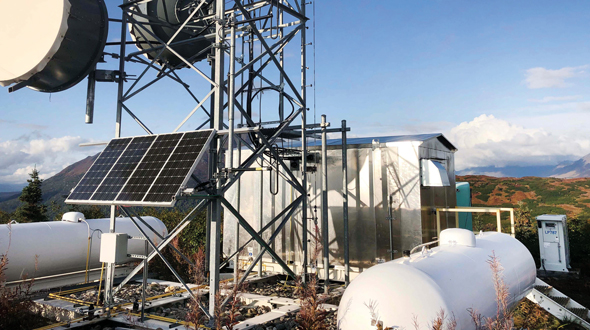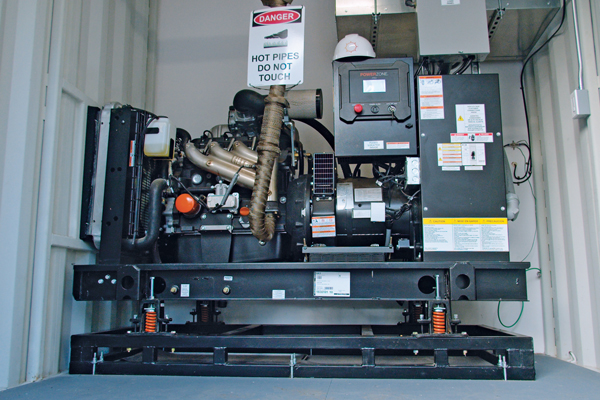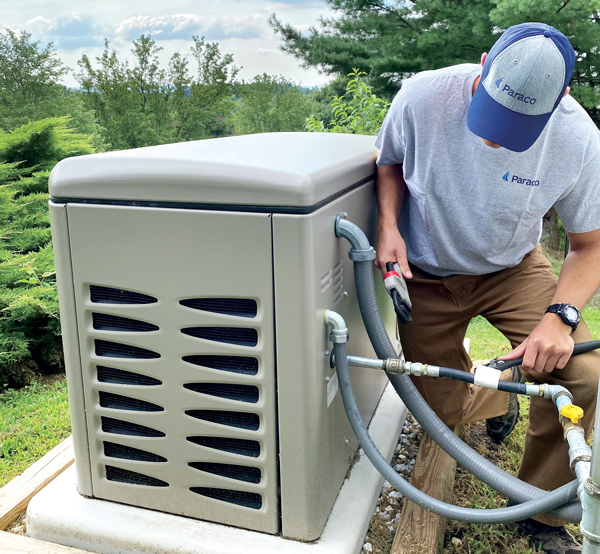Propane generators ease power outage anxieties
Installing a propane generator to produce a reliable supply of standby electricity is fast becoming the new normal.
Power outages have become more frequent while lasting for longer durations as the country’s antiquated electrical infrastructure continues to deteriorate. Crisis situations arose in Texas and California during the winter heating season due to widespread electrical failures.

Qnergy’s Stirling engine generator is used for a remote cell tower in Alaska. Photo courtesy of Qnergy
While not every local area was experiencing the drama of this summer’s record-high temperatures, overheated and sagging powerlines, rolling brownouts and blackouts, and the accompanying raging wildfires, just about any home or business can benefit from an auxiliary propane generator to guarantee a backup supply of electricity.
A certain level of overall living comfort and appliance convenience is maintained; anxiety over cooling and heating issues can be mitigated along with meeting any electrical-based household medical needs, plus critical computer equipment and other electronics remain functional.
From Washington state to Washington, D.C., a smoky haze hung over much of the nation this summer as West Coast forest fires flared out of control. Driven by sustained drought, scorching temperatures and high winds, the blazes brought with them vast regional electrical outages that called for propane generators to keep the current flowing.
As of mid-July, more than 80 wildfires were spreading across 13 states, including 17 in Montana alone. (Canada’s Manitoba and Ontario provinces were being menaced by 200-plus separate forest fires.) Oregon’s Bootleg fire had grown to exceed 408,000 acres, more than half the size of Rhode Island.
In addition to electrical interruptions induced by burned poles and powerlines, brownouts and blackouts were initiated by authorities to minimize the threats associated with hot, dry and windy weather.
The month of June registered as the historically hottest June in all of America since record keeping began 127 years ago. California’s temperatures averaged nearly 7 degrees above normal, while a prolonged heat wave in the Pacific Northwest netted mercury readings that soared 40 degrees beyond their typical readings.
Enter propane to help ease the extremes inflicted upon the power grid as residents relied on propane-powered generators to maintain their electrical connections.
Widespread concerns
Although the West Coast garnered much of the attention this time around, expect future wide-ranging electrical failures on a frequent basis throughout the country due to the nation’s antiquated electrical grid and its inherent flaws, according to Darren Engle, director of marketing for Blue Star Gas, which has 12 locations throughout California, Oregon, Washington, Utah and Arizona.
Founded in 1938, the third-generation, family-owned propane business recently claimed Kohler’s Dealer of the Year honors for the generator manufacturer’s western region, consisting of more than 650 Kohler dealers.
Along with straight-up electrical generators, demand for combined heat and power (CHP) units is on the rise as well.
“They are selling like hotcakes out here,” Engle says, adding the CHP technology also offers cooling capabilities. “It’s been a huge growth market for us.”
When marketers are able to sell a generator to customers who have been previously unaware of propane’s positive properties, “it definitely opens the door” for other propane appliance sales, especially tankless hot water heaters, according to Engle.
Blue Star Gas launched a new dedicated propane electrical generating division in July under the direction of Mark Leitman, who credits its generator distributor, Bay City Electric Works, for providing within a short period of time the necessary expertise, training and product support for Kohler’s line of generators.
Blue Star Gas President Jeff Stewart says the company is expanding its current pace of propane generator sales while exploring additional products that integrate battery storage and hybrid systems capable of off-grid power and also combining the elements of solar and battery storage with propane power generation.
The propane generator market “really started to ramp up” in 2017 after a series of devastating California wildfires, says Leitman.
Electrical utilities have introduced a policy of PSPS, which stands for “public safety power shutoffs.” When fire-inducing dry and windy conditions are present, utilities proactively start disconnecting the threatened power grids, leaving homes and businesses in the dark.
“They will shut off a few thousand here and a few thousand there depending on the conditions for wildfires,” Leitman says.
The strategies have prompted residents to seek permanent backup propane-powered options rather than threading an extension cord through a window and wrestling a portable generator into position.
The installation of a hard-wired generator system and propane tank set costs along the lines of $3,000 to $4,000.
“These are not inexpensive jobs, but it’s the way to go,” says Leitman. “We install our units so they’re safe and quiet – no cords to trip over.”
Blue Star Gas partners only with professional electrical contractors who are licensed and certified, says Leitman, adding that these collaborations are conducive to both parties. “Sometimes they bring business to us, and sometimes we bring business to them,” he notes.
On an in-house level, “Our people are dually trained in both propane and generators,” Leitman reports. Education is provided by Kohler distributors via three-day courses covering first and second levels of instruction. “You go straight to the manufacturer or distributor for training,” he stresses.
“There’s a lot to learn about the product and the service,” says Leitman, who previously held several market development positions with the Propane Education & Research Council (PERC).

A Generac propane generator integrates with solar and storage in a California microgrid. Photo courtesy of Generac
Delivering backup resilience
CHPs are gaining in consumer popularity as propane marketers increasingly extol their advantages. Capable of forming a remote electrical micro-grid, a CHP uses a propane generator for creating electricity as it simultaneously captures the engine’s heat to produce hot water – operating at peak efficiency to further reduce energy costs. PERC reports that they are ideal for homes, multi-family dwellings and small businesses.
They can grow a propane retailer’s gallons while slashing customer utility bills for a variety of commercial buildings, including hotels and resorts, due to their year-round hot water load for laundry, pool heating, guest rooms, radiant heating and more, according to Gokul Vishwanathan, PERC’s director of research and sustainability.
A CHP delivers desired backup resilience by providing power close to where it is being used, says Joseph Calhoun, PERC’s associate director of business development.
He emphasizes a “three-legged stool” aspect of the technology’s capabilities and how customers avoid being in proximity to a dirty diesel generator as they garner added convenience and efficiencies. “Being resilient means you’re going to have a solution to provide,” Calhoun points out.
As part of its wildfire mitigation plan in California, Liberty Utilities near Lake Tahoe has been de-energizing some of its powerlines when needed as a preventative measure during peak fire season, relying instead on a solar/battery micro-grid array that includes a Generac propane electric generator for standby emergency power.
The project required a unique approach due to its location in a remote area of the pristine Sierra Nevada region that gets large amounts of (solar-shading) snow in the winter. Tony Mente, Generac’s industrial solutions manager, says the propane-powered system provides a flexible, dependable package with a low-carbon footprint.
In Hawaii, on the island of Oahu, a Generac propane generator is positioned for reliable standby electrical power to augment the solar system utilized by Kahauiki Village, which provides long-term, permanent, affordable housing for more than 600 people on 12 acres of land.
Hawaii Gas, along with representatives from across the state’s major energy sector, was among the project partners that played an integral role in identifying and designing a cost-effective, reliable and resilient energy system, according to Brian Yee, Hawaii Gas’ project manager for the installation.
“Having multiple energy sources,” says Yee, “creates resiliency for the community that allows them to have power through any type of event.”
“There are many options when it comes to power needs during an emergency,” says Jake Thomas, director of service operations at Generac. “Portable generators can back up a few important appliances, but automatic home standby generators offer greater peace of mind by providing power to an entire home and can run continuously until power returns. There is a solution for every home and budget.”
Generating partnerships
Propane power generation is connecting in a big way with customers in the Northeast who in 2012 suffered through major inconveniences inflicted by Hurricane Sandy.

Propane generators are a hot commodity in the Northeast, Paraco Gas says. Photo courtesy of Paraco Gas
“It’s a very hot commodity,” complete with a waiting list and premium pricing, says Andy Mirchin, director of market development at Paraco Gas.
Not only are the hard-wired models sold in cooperation with electrical contractors moving at an accelerated clip, “but the portable ones are a hot market, too,” he says.
Looking back at utility deprivations from Hurricane Sandy and ruminating over a heightened pattern of more storms with higher winds, customers often ask for a larger tank than initially specified during the installation procedure.
“People say, ‘I want at least four to five days of storage,’” Mirchin says, adding that a generator customer frequently purchases additional propane products.
“People are more interested in getting a generator when they watch the news” and see what climate-oriented calamities and challenges may be headed into town.
“It’s a growing part of everybody’s business now,” Mirchin reports. “With global warming, there seems to be more storms out there, and with our antiquated infrastructure,” that means frequent and more sustained power outages.
“We work closely with the majority of generator manufacturers and electricians” in order to ensure a productive and safe sales and installation process, according to Mirchin. “We market to electricians – we can be a partner to them with generators.”
Indefinite storage capabilities
David Kennedy, director of alternative energy at Blossman Gas, says the company is busy selling generator sets and installing tanks for electric contractors.
Lately “it’s been a pretty dramatic increase” for generator sales because people have been staying home during the pandemic and using more power due to an increasing number of electrical appliances that place ever-higher stresses on the entire grid – a trend that creates a sense of unease.
“The electrical grid does not have the power to support everything electrical in their house,” Kennedy says. “There’s too many people pulling electrical load, and it’s causing the grid to fail.
“It’s growing dramatically as a problem,” he notes, “and when the power grid fails, it’s not just in the winter, but also in the summer.”
Reflecting on the western wildfires and other emergency incidents sparking evacuation orders, Kennedy tells of the concerns of drivers who own electric vehicles. An EV can’t flee trouble if the battery charger lacks sufficient power.
“They didn’t have enough power to evacuate because their electricity was cut off,” he recounts, “so now they have a propane generator.”
Kennedy points out that among the many advantages of propane generators over diesel generators is that “propane can be stored indefinitely,” while diesel fuel starts to go bad after six months or so.
A propane irrigation pump setup can sit idle in an isolated agricultural or livestock setting for a lengthy period of time and reliably operate when need arises.
“Propane can be stored forever,” says Kennedy, “and if I have propane I have a system if the grid stops: I’m not letting someone else make the decision if I have electricity or not.”
















